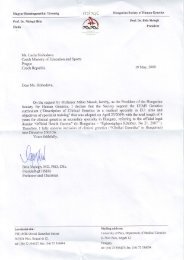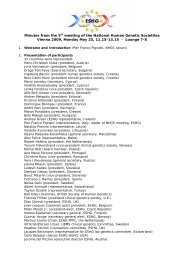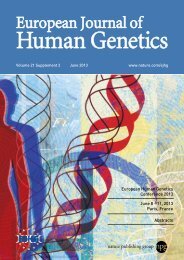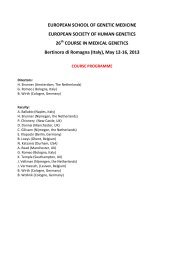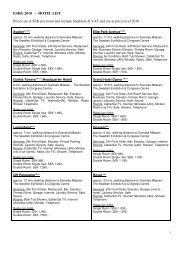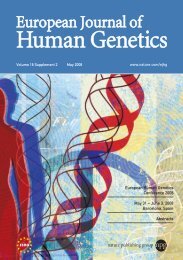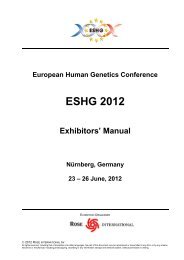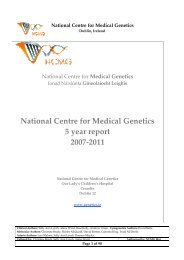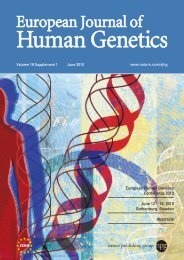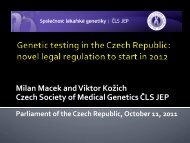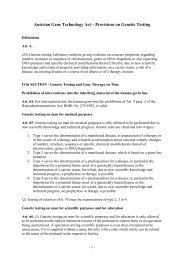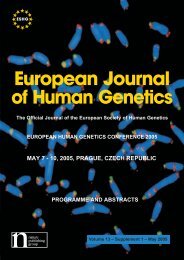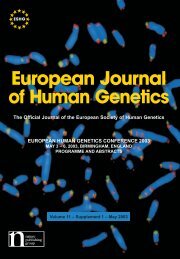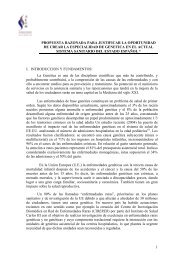Complex traits and polygenic disorders tein. Our finding indicate that ABCB4 mutations seem to predispose to ICP phenotype in less than 20% <strong>of</strong> the affected women, irrespective <strong>of</strong> serum γGT levels. P09.061 Variation in the interleukin-1 receptor-associated kinase 3 gene and susceptibility to sepsis induced-acute lung injury C. Flores 1,2 , M. Pino-Yanes 1,2 , T. Paula 3 , L. Perez-Mendez 1,2 , E. Espinosa 4 , A. Corrales 1,2 , R. Sanguesa 4 , M. Hernandez 5 , A. Muriel 6 , M. Muros 1,7 , J. Blanco 1,6 , J. Villar 1,8 ; 1 CIBER de Enfermedades Respiratorias, Spain, 2 Research Unit, Hospital Universitario NS de Candelaria, Spain, 3 Department <strong>of</strong> Environmental Health, Harvard School <strong>of</strong> Public Health, Boston, MA, United States, 4 Department <strong>of</strong> Anesthesia, Hospital Universitario NS de Candelaria, Spain, 5 Department <strong>of</strong> <strong>Genetics</strong>, Universidad de La Laguna, Spain, 6 Intensive Care Unit, Hospital Universitario Rio Hortega, Spain, 7 Department <strong>of</strong> Clinical Biochemistry, Hospital Universitario NS de Candelaria, Spain, 8 MODERN, Research Unit, Hospital Universitario Dr. Negrin, Spain. Sepsis is the most common cause <strong>of</strong> acute lung injury (ALI), organ dysfunction and death in critically ill patients. The Toll/NF-κB signaling pathway has a key role in the immune response to infections. Variants in two genes encoding for interleukin-1 receptor-associated kinases (IRAKs) modify the immune response to pathogens and associate with increased risk for severe complications during sepsis. Based on gene expression data, showing up-regulation <strong>of</strong> IRAK3 in both animal models <strong>of</strong> sepsis and in septic patients, here we explored whether common variants <strong>of</strong> this gene were associated with susceptibility and outcomes in severe sepsis. We re-sequenced 23 kb non-repetitive regions <strong>of</strong> the gene in 32 Spanish samples, and selected a set <strong>of</strong> 7 tagging SNPs (tagSNPs) that efficiently captured common variation in the population. To test the association, tagSNPs were genotyped in 214 severe sepsis cases and 336 population-based controls using the MassArray® iPLEX Gold (Sequenom Inc.). One tagSNP showed a significant association with ALI (p=0.005), and remained significant after multiple testing adjustments. Indirect testing <strong>of</strong> untyped alleles revealed two correlated SNPs (r 2 =0.85) from the 5’ flanking region <strong>of</strong> the gene associated with ALI (permuted p=0.02), that were validated by further genotyping and direct testing (pA (rs6766410, p.N163K) coding variant to be associated with female IBS-D (P= 0.0019; OR = 4.98 CI = [1.75-14.16]), whereas no association could be found in males. Calcium influx analyses <strong>of</strong> the 5-HT 3A/C p.163N and 5-HT 3A/C p.163K receptors resembling the homozygous genotypes revealed identical potencies <strong>of</strong> 5-HT and two 5-HT 3 antagonists. However, 5-HT showed decreased efficacy at 5-HT 3A/C p.163N (78.1 ± 5.9 %) compared with 5-HT 3A/C p.163K (100 %, P < 0.01, n = 14) receptors and radioligand binding assays revealed a reduced B max for the 5-HT 3A/C p.163N (86.2 ± 3.7 %) compared with the 5-HT 3A/C p.163K receptor (100 %, P
Complex traits and polygenic disorders P09.065 A study <strong>of</strong> Kashin-Beck Disease in the homogeneous population <strong>of</strong> tibet in china R. S. Gunasekera 1,2 , J. Cokenour 1 , P. Sen 3 , D. Heath 4 , M. Han 5 ; 1 University <strong>of</strong> Houston-Victoria, Victoria, TX, United States, 2 <strong>Human</strong>itarian Solutions, Inc., Pearland, TX, United States, 3 Baylor College <strong>of</strong> Medicine, Houston, TX, United States, 4 Innovative <strong>Human</strong>itarian Solutions, Inc., Pearland, TX, United States, 5 ProHealth Physicians, Manchester, CT, United States. Kashin-Beck disease (KBD) is an osteoarthropathy which manifests in children marked by dramatically low levels <strong>of</strong> serum selenium, iodine, bone and joint deformity, and limited mobility. The disease is endemic to rural Tibet, China; North Korea, and Siberia. Early investigations had led to the hypothesis that the disease was due to dietary factors, due to deficiencies in certain essential nutrients in high plateaus. However, supplementation <strong>of</strong> the deficient trace minerals conducted by others has had no positive effect on affected persons. Our group has begun investigations to the possibility that genetic elements may also be involved with possible environmental effects in-utero. Pedigree studies were conducted on 200 individuals in nuclear families with clinical symptoms. Patients observed ranged from 6 to more than 60 years. KBD was diagnosed when an affected person had persistent pain, restricted mobility, or deformity <strong>of</strong> the knees, ankles, elbows, wrist, interphalangeal joints, hips, or shoulders, in the absence <strong>of</strong> trauma. Preliminary analysis suggests KBD having an autosomal recessive pattern <strong>of</strong> inheritance in most families with a possible higher penetrance in women. Occurrence <strong>of</strong> the disease exhibits familial aggregation while suggesting the form <strong>of</strong> inheritance polygenetic, and due to multifactorial factors. Initial studies further suggests that deficiencies in selenium and iodine may not be causal, but markers <strong>of</strong> an underlying condition <strong>of</strong> extreme oxidative stress brought on by reactive oxygen species acting to inhibit proper mesenchymal cell and bone development by apoptosis. This study attempts to describe pedigree investigations and nutritional genomics <strong>of</strong> the disease. P09.066 Association <strong>of</strong> the AcE and BDKRB2 gene polymorphisms with physical performance <strong>of</strong> kayakers E. B. Akimov, I. I. Ahmetov, D. V. Rebrikov, A. G. Tonevitsky; All-Russian Research Institute <strong>of</strong> Physical Culture and Sports, Moscow, Russian Federation. Circulating angiotensin I converting enzyme (ACE) exerts a tonic regulatory function in circulatory homeostasis, through the synthesis <strong>of</strong> vasoconstrictor angiotensin II, which also drives aldosterone synthesis, and the degradation <strong>of</strong> vasodilator kinins. A polymorphism in intron 16 <strong>of</strong> the human ACE gene has been identified in which the presence (I allele) rather than the absence (D allele) <strong>of</strong> a 287 bp Alu-sequence insertion fragment is associated with lower serum and tissue ACE activity. Bradykinin is a potent endothelium-dependent vasodilator and acts via the bradykinin B2 receptor (encoded by BDKRB2). The absence (-9), rather than the presence (+9), <strong>of</strong> a 9 bp repeat sequence in exon 1 has previously been shown to be associated with increased gene transcription and higher BDKRB2 mRNA expression. The aim <strong>of</strong> the study was to find interrelation between ACE and BDKRB2 gene polymorphisms and physical performance <strong>of</strong> elite Russian kayakers. Genotyping was performed by RT-PCR. Physiological parameters were evaluated by Kayak Ergometer and MetaLyzer II Gas Analyzer at the beginning and at the end <strong>of</strong> preparation period. Maximal oxygen consumption was increased by 12.7% and 14.8% in males and females, respectively. Furthermore, the ventilation volume (VE) was decreased by 9.6% in males. The total number <strong>of</strong> ACE I and BDKRB2 -9 alleles, favorable for endurance performance, was negatively correlated with VE values in males (p=0.0074) and females (p=0.017), indicating that these alleles are associated with the improvement <strong>of</strong> work economization <strong>of</strong> respiratory muscles (one <strong>of</strong> the indicators <strong>of</strong> aerobic capacity). P09.067 <strong>European</strong> Lactase Persistence Allele is Associated With increase in Body mass index J. A. Kettunen 1,2 , K. Silander 2,3 , O. Saarela 3 , V. Anttila 1 , J. Laitinen 4 , A. Hartikainen 5 , A. Pouta 5,6 , P. Lahermo 2 , S. Männistö 3 , A. Jula 7 , J. Virtamo 3 , V. Salomaa 3 , G. Davey Smith 8 , M. I. McCarthy 9,10 , M. Järvelin 11,12 , M. Perola 13,3 , L. Peltonen 1,2 ; 1 Wellcome Trust Sanger Institute, Cambridge, United Kingdom, 2 FIMM, Institute for Molecular Medicine, Helsinki, Finland, 3 National Institute for Health and Welfare, Department <strong>of</strong> Chronic Disease Prevention, Helsinki, Finland, 4 Finnish National Institute <strong>of</strong> Occupational Health, Oulu, Finland, 5 Department <strong>of</strong> Clinical Sciences/ Obstetrics and Gynecology, Oulu, Finland, 6 National Public Health Institute and University <strong>of</strong> Oulu, Oulu, Finland, 7 Department <strong>of</strong> Health and Functional Capacity, National Public Health Institute, Helsinki, Finland, 8 MRC Centre <strong>of</strong> Causal Analyses in Translational Epidemiology, University <strong>of</strong> Bristol, Bristol, United Kingdom, 9 Oxford Centre for Diabetes, Endocrinology and Metabolism, Oxford, United Kingdom, 10 The Wellcome Trust Centre for <strong>Human</strong> <strong>Genetics</strong>, Oxford, United Kingdom, 11 Department <strong>of</strong> Epidemiology and Public Health, Imperial College London, London, United Kingdom, 12 Institute <strong>of</strong> Health Sciences, University <strong>of</strong> Oulu, Oulu, Finland, 13 FIMM, Institute for Molecular Medicine Finland, Helsinki, Finland. The global prevalence <strong>of</strong> obesity, usually indexed by body mass index (BMI) cut-<strong>of</strong>fs, has increased significantly in the recent decades, mainly due to positive energy balance. However, the impact <strong>of</strong> a selection for specific genes cannot be excluded. Here we have tested the association between BMI and one <strong>of</strong> the best known genetic variants showing strong selective pressure: the functional variant in the cisregulatory element <strong>of</strong> the lactase gene. We tested this variant since it is presumed to provide nutritional advantage in specific physical and cultural environments. We found that the variant responsible for lactase persistence among <strong>European</strong>s was also associated with higher BMI in a Nordic population sample (p = 1.3*10 -5 ) <strong>of</strong> 15 209 individuals, the size <strong>of</strong> the effect being close to that <strong>of</strong> FTO. We tested the effect <strong>of</strong> population stratification and concluded that the association was not due to population substructure. P09.068 Association between copy number variation <strong>of</strong> glycogen synthase kinase 3 beta / Nr1i2 and major depression Z. Elek 1 , E. Szantai 1 , R. Nagy 1 , G. Faludi 2 , A. Sarosi 2 , M. Sasvari-Szekely 1 ; 1 Department <strong>of</strong> Medical Chemistry, Molecular Biology and Pathobiochemistry, Semmelweis University, Budapest, Hungary, 2 Department <strong>of</strong> Clinical and Theoretical Mental Health, Kútvölgyi Clinical Center, Semmelweis University, Budapest, Hungary. Copy number variation (CNV) or copy number polymorphism (CNP) is a novel approach in candidate gene studies. Recently, glycogen synthase kinase 3 beta (Gsk3β) and its adjacent gene, Nr1i2 (pregnane X receptor is<strong>of</strong>orm) has been reported to associate with bipolar depression (Lachman et al, 2007. Here we present a case - control study <strong>of</strong> 216 patients with major depression and 175 controls, involving the chromosomal region <strong>of</strong> glycogen synthase kinase 3 beta (Gsk3β) and its adjacent genes, Nr1i2 and C3ORF15. The gene dosage has been measured by Taqman (Applied Biosystems) real time PCR systems, as well as by conventional PCR and capillary electrophoresis. In accordance with the previously published results, the variations in the copy number <strong>of</strong> the above genes seem to be very rare, although an accumulation <strong>of</strong> increased copy number has been found in the patient group (4/216 vs. 1/175). On the other hand we did not find any deletion <strong>of</strong> these genes in our samples. Taking together the published results <strong>of</strong> Lachman et al. and ours, amplification <strong>of</strong> this region seems to have a significant (p=0.006) increase among patients with major depression. P09.069 Significant associations between AKT1 SNP markers and Major Depressive Disorder in the chinese population Z. Z. Zhao1 , X. Q. Chen2 , D. Q. Li1 , M. J. Wang1 , M. Ai1 , N. Chen2 , J. M. Chen1 , X. M. Li1 , L. Kuang1 ; 1The First Affiliated Hospital, Chongqing Medical University, Chongqing, China, 2West China Hospital, West China Medical School, Sichuan University, Chengdu, China. Background: V-akt murine thymoma viral oncogene homologue 1 (AKT1) is a serine/threonine kinase. Abnormality <strong>of</strong> AKT1 is involved in various diseases, including mental disorder. Recent evidence suggests that the Variation in AKT1 gene has been associated with schizophrenia, Parkinson’s disease and type II diabetes. But the relationship <strong>of</strong> AKT1 gene variation in depression is unknown. The aim <strong>of</strong> the present study was to investigate the potential role <strong>of</strong> variability within AKT1 gene polymorphisms as a risk factor for major depressive disorder (MDD). Method: We performed a case-control association analysis <strong>of</strong> AKT1. Five single nucleotide polymorphisms (SNPs) according to the origi-
- Page 1 and 2:
Volume 17 Supplement 2 May 2009 www
- Page 3 and 4:
European Society of Human Genetics
- Page 5 and 6:
Table of Contents spoken Presentati
- Page 7 and 8:
Plenary Lectures PL2.2 massive para
- Page 9 and 10:
Concurrent Symposia s01.1 Genome va
- Page 11 and 12:
Concurrent Symposia Monogenic diabe
- Page 13 and 14:
Concurrent Symposia invariable in t
- Page 15 and 16:
Concurrent Symposia s11.2 clinical,
- Page 17 and 18:
Concurrent Symposia s13.2 A novel g
- Page 19 and 20:
Concurrent Sessions c01.1 mRNA-seq
- Page 21 and 22:
Concurrent Sessions velopmental del
- Page 23 and 24:
Concurrent Sessions development of
- Page 25 and 26:
Concurrent Sessions c04.6 Duplicati
- Page 27 and 28:
Concurrent Sessions genes to be rec
- Page 29 and 30:
Concurrent Sessions c07.5 Prenatal
- Page 31 and 32:
Concurrent Sessions with familial h
- Page 33 and 34:
Concurrent Sessions University of W
- Page 35 and 36:
Concurrent Sessions with this, we f
- Page 37 and 38:
Concurrent Sessions had immotile ci
- Page 39 and 40:
Concurrent Sessions abnormal glycos
- Page 41 and 42:
Concurrent Sessions showers’ and
- Page 43 and 44:
Concurrent Sessions partial gene de
- Page 45 and 46:
Concurrent Sessions leads to distre
- Page 47 and 48:
Genetic counseling Genetics educati
- Page 49 and 50:
Genetic counseling Genetics educati
- Page 51 and 52:
Genetic counseling Genetics educati
- Page 53 and 54:
Genetic counseling Genetics educati
- Page 55 and 56:
Genetic counseling Genetics educati
- Page 57 and 58:
Genetic counseling Genetics educati
- Page 59 and 60:
Clinical genetics and Dysmorphology
- Page 61 and 62:
Clinical genetics and Dysmorphology
- Page 63 and 64:
Clinical genetics and Dysmorphology
- Page 65 and 66:
Clinical genetics and Dysmorphology
- Page 67 and 68:
Clinical genetics and Dysmorphology
- Page 69 and 70:
Clinical genetics and Dysmorphology
- Page 71 and 72:
Clinical genetics and Dysmorphology
- Page 73 and 74:
Clinical genetics and Dysmorphology
- Page 75 and 76:
Clinical genetics and Dysmorphology
- Page 77 and 78:
Clinical genetics and Dysmorphology
- Page 79 and 80:
Clinical genetics and Dysmorphology
- Page 81 and 82:
Clinical genetics and Dysmorphology
- Page 83 and 84:
Clinical genetics and Dysmorphology
- Page 85 and 86:
Clinical genetics and Dysmorphology
- Page 87 and 88:
Clinical genetics and Dysmorphology
- Page 89 and 90:
Clinical genetics and Dysmorphology
- Page 91 and 92:
Clinical genetics and Dysmorphology
- Page 93 and 94:
Clinical genetics and Dysmorphology
- Page 95 and 96:
Clinical genetics and Dysmorphology
- Page 97 and 98:
Clinical genetics and Dysmorphology
- Page 99 and 100:
Clinical genetics and Dysmorphology
- Page 101 and 102:
Clinical genetics and Dysmorphology
- Page 103 and 104:
Clinical genetics and Dysmorphology
- Page 105 and 106:
Cytogenetics P03. cytogenetics Recu
- Page 107 and 108:
Cytogenetics use of metaphase analy
- Page 109 and 110:
Cytogenetics 2: mother’s age < fa
- Page 111 and 112:
Cytogenetics P03.028 HLA B27 allele
- Page 113 and 114:
Cytogenetics karyotype revealed a p
- Page 115 and 116:
Cytogenetics drome is estimated at
- Page 117 and 118:
Cytogenetics P03.057 Pathological c
- Page 119 and 120:
Cytogenetics grandmother and 2 mate
- Page 121 and 122:
Cytogenetics method used to detect
- Page 123 and 124:
Cytogenetics P03.082 High-resolutio
- Page 125 and 126:
Cytogenetics All detected anomalies
- Page 127 and 128:
Cytogenetics somy for chromosome 2.
- Page 129 and 130:
Cytogenetics cially in chromosome 4
- Page 131 and 132:
Cytogenetics (59.390.122 to 62.021.
- Page 133 and 134:
Cytogenetics For further characteri
- Page 135 and 136:
Cytogenetics 9p duplication. This c
- Page 137 and 138:
Cytogenetics regions with mental /d
- Page 139 and 140:
Cytogenetics donation program of po
- Page 141 and 142:
Cytogenetics P03.165 interpretation
- Page 143 and 144:
Cytogenetics P03.174 Deletion of th
- Page 145 and 146:
Cytogenetics P03.183 An atypical 7q
- Page 147 and 148:
Cytogenetics spermia, 11 oligosperm
- Page 149 and 150:
Reproductive genetics and social fa
- Page 151 and 152:
Reproductive genetics mosomal chang
- Page 153 and 154:
Reproductive genetics two cohorts w
- Page 155 and 156:
Reproductive genetics the 147 SC ch
- Page 157 and 158:
Prenatal and perinatal genetics P05
- Page 159 and 160:
Prenatal and perinatal genetics and
- Page 161 and 162:
Prenatal and perinatal genetics fro
- Page 163 and 164:
Prenatal and perinatal genetics dev
- Page 165 and 166:
Prenatal and perinatal genetics in
- Page 167 and 168:
Prenatal and perinatal genetics obj
- Page 169 and 170:
Prenatal and perinatal genetics P05
- Page 171 and 172:
Cancer genetics P06.005 tiling reso
- Page 173 and 174:
Cancer genetics tient group in whic
- Page 175 and 176:
Cancer genetics chronic inflammatio
- Page 177 and 178:
Cancer genetics licular thyroid can
- Page 179 and 180:
Cancer genetics also studied. In 31
- Page 181 and 182:
Cancer genetics tile polyposis. We
- Page 183 and 184:
Cancer genetics Upon recombinant ex
- Page 185 and 186:
Cancer genetics variant allele was
- Page 187 and 188:
Cancer genetics from patients with
- Page 189 and 190:
Cancer genetics tion (PAX5 and GATA
- Page 191 and 192:
Cancer genetics scribed underexpres
- Page 193 and 194:
Cancer genetics of the ZIC gene fam
- Page 195 and 196:
Cancer genetics Materials and metho
- Page 197 and 198:
Cancer genetics the past and it is
- Page 199 and 200: Cancer genetics P06.130 spectrum an
- Page 201 and 202: Cancer genetics P06.139 the role of
- Page 203 and 204: Cancer genetics and MSH2 germline m
- Page 205 and 206: Cancer genetics P06.155 New roles f
- Page 207 and 208: Cancer genetics screening was perfo
- Page 209 and 210: Cancer genetics val (DFI) than pati
- Page 211 and 212: Cancer genetics is hTERC gene ampli
- Page 213 and 214: Cancer genetics on chromosome regio
- Page 215 and 216: Cancer genetics preferentially dupl
- Page 217 and 218: Cancer cytogenetics mutations in co
- Page 219 and 220: Cancer cytogenetics P07.08 molecula
- Page 221 and 222: Statistical genetics, includes Mapp
- Page 223 and 224: Statistical genetics, includes Mapp
- Page 225 and 226: Statistical genetics, includes Mapp
- Page 227 and 228: Statistical genetics, includes Mapp
- Page 229 and 230: Statistical genetics, includes Mapp
- Page 231 and 232: Statistical genetics, includes Mapp
- Page 233 and 234: Statistical genetics, includes Mapp
- Page 235 and 236: Complex traits and polygenic disord
- Page 237 and 238: Complex traits and polygenic disord
- Page 239 and 240: Complex traits and polygenic disord
- Page 241 and 242: Complex traits and polygenic disord
- Page 243 and 244: Complex traits and polygenic disord
- Page 245 and 246: Complex traits and polygenic disord
- Page 247 and 248: Complex traits and polygenic disord
- Page 249: Complex traits and polygenic disord
- Page 253 and 254: Complex traits and polygenic disord
- Page 255 and 256: Complex traits and polygenic disord
- Page 257 and 258: Complex traits and polygenic disord
- Page 259 and 260: Complex traits and polygenic disord
- Page 261 and 262: Complex traits and polygenic disord
- Page 263 and 264: Complex traits and polygenic disord
- Page 265 and 266: Complex traits and polygenic disord
- Page 267 and 268: Evolutionary and population genetic
- Page 269 and 270: Evolutionary and population genetic
- Page 271 and 272: Evolutionary and population genetic
- Page 273 and 274: Evolutionary and population genetic
- Page 275 and 276: Evolutionary and population genetic
- Page 277 and 278: Evolutionary and population genetic
- Page 279 and 280: Evolutionary and population genetic
- Page 281 and 282: Evolutionary and population genetic
- Page 283 and 284: Evolutionary and population genetic
- Page 285 and 286: Genomics, Genomic technology and Ep
- Page 287 and 288: Genomics, Genomic technology and Ep
- Page 289 and 290: Genomics, Genomic technology and Ep
- Page 291 and 292: Genomics, Genomic technology and Ep
- Page 293 and 294: Genomics, Genomic technology and Ep
- Page 295 and 296: Genomics, Genomic technology and Ep
- Page 297 and 298: Genomics, Genomic technology and Ep
- Page 299 and 300: Genomics, Genomic technology and Ep
- Page 301 and 302:
Genomics, Genomic technology and Ep
- Page 303 and 304:
Genomics, Genomic technology and Ep
- Page 305 and 306:
Genomics, Genomic technology and Ep
- Page 307 and 308:
Genomics, Genomic technology and Ep
- Page 309 and 310:
Genomics, Genomic technology and Ep
- Page 311 and 312:
Genomics, Genomic technology and Ep
- Page 313 and 314:
Molecular basis of Mendelian disord
- Page 315 and 316:
Molecular basis of Mendelian disord
- Page 317 and 318:
Molecular basis of Mendelian disord
- Page 319 and 320:
Molecular basis of Mendelian disord
- Page 321 and 322:
Molecular basis of Mendelian disord
- Page 323 and 324:
Molecular basis of Mendelian disord
- Page 325 and 326:
Molecular basis of Mendelian disord
- Page 327 and 328:
Molecular basis of Mendelian disord
- Page 329 and 330:
Molecular basis of Mendelian disord
- Page 331 and 332:
Molecular basis of Mendelian disord
- Page 333 and 334:
Molecular basis of Mendelian disord
- Page 335 and 336:
Molecular basis of Mendelian disord
- Page 337 and 338:
Molecular basis of Mendelian disord
- Page 339 and 340:
Molecular basis of Mendelian disord
- Page 341 and 342:
Molecular basis of Mendelian disord
- Page 343 and 344:
Molecular basis of Mendelian disord
- Page 345 and 346:
Molecular basis of Mendelian disord
- Page 347 and 348:
Molecular basis of Mendelian disord
- Page 349 and 350:
Molecular basis of Mendelian disord
- Page 351 and 352:
Metabolic disorders P12.167 Pattern
- Page 353 and 354:
Metabolic disorders PKU. BH4 challe
- Page 355 and 356:
Metabolic disorders catepe Universi
- Page 357 and 358:
Metabolic disorders respectively. G
- Page 359 and 360:
Metabolic disorders enzymaticaly co
- Page 361 and 362:
Metabolic disorders Normal Affected
- Page 363 and 364:
Therapy for genetic disorders in th
- Page 365 and 366:
Therapy for genetic disorders P14.0
- Page 367 and 368:
Therapy for genetic disorders of me
- Page 369 and 370:
Laboratory and quality management P
- Page 371 and 372:
Laboratory and quality management T
- Page 373 and 374:
Molecular and biochemical basis of
- Page 375 and 376:
Molecular and biochemical basis of
- Page 377 and 378:
Molecular and biochemical basis of
- Page 379 and 380:
Molecular and biochemical basis of
- Page 381 and 382:
Molecular and biochemical basis of
- Page 383 and 384:
Molecular and biochemical basis of
- Page 385 and 386:
Genetic analysis, linkage ans assoc
- Page 387 and 388:
Genetic analysis, linkage ans assoc
- Page 389 and 390:
Genetic analysis, linkage ans assoc
- Page 391 and 392:
Genetic analysis, linkage ans assoc
- Page 393 and 394:
Genetic analysis, linkage ans assoc
- Page 395 and 396:
Genetic analysis, linkage ans assoc
- Page 397 and 398:
Genetic analysis, linkage ans assoc
- Page 399 and 400:
Genetic analysis, linkage ans assoc
- Page 401 and 402:
Genetic analysis, linkage ans assoc
- Page 403 and 404:
Author Index Allanson, J.: P02.140
- Page 405 and 406:
Author Index 0 Barbacioru, C.: C01.
- Page 407 and 408:
Author Index 0 Bonneau, D.: C16.2,
- Page 409 and 410:
Author Index 0 Chakravarti, A.: C13
- Page 411 and 412:
Author Index 0 Dan, D.: P01.39, P14
- Page 413 and 414:
Author Index 0 Duskova, J.: P06.012
- Page 415 and 416:
Author Index Franke, A.: P09.056 Fr
- Page 417 and 418:
Author Index Grasso, R.: P02.025 Gr
- Page 419 and 420:
Author Index Holder-Espinasse, M.:
- Page 421 and 422:
Author Index Jurkiewicz, E.: C14.5
- Page 423 and 424:
Author Index Kooper, A. J. A.: P05.
- Page 425 and 426:
Author Index Li, K. J.: P11.086 Li,
- Page 427 and 428:
Author Index Martinet, D.: P03.095
- Page 429 and 430:
Author Index Moorman, A. F. M.: P16
- Page 431 and 432:
Author Index P10.57, P10.82 Oguzkan
- Page 433 and 434:
Author Index P09.054, P09.085, P09.
- Page 435 and 436:
Author Index P16.01 Renieri, A.: P0
- Page 437 and 438:
Author Index Santorelli, F.: P08.55
- Page 439 and 440:
Author Index Sinke, R. J.: P02.020
- Page 441 and 442:
Author Index Taheri, M.: P04.33, P0
- Page 443 and 444:
Author Index Valentino, P.: P02.064
- Page 445 and 446:
Author Index Wiemer-Kruel, A.: P14.
- Page 447 and 448:
Keyword Index 1 10q22 deletions: P0
- Page 449 and 450:
Keyword Index autosomal dominant re
- Page 451 and 452:
Keyword Index CLA: P06.073 CLCN1 ge
- Page 453 and 454:
Keyword Index DMD: P16.40, P16.41,
- Page 455 and 456:
Keyword Index gene networks: S12.2
- Page 457 and 458:
Keyword Index hydrocephaly: P05.11
- Page 459 and 460:
Keyword Index malignant hyperthermi
- Page 461 and 462:
Keyword Index NAT2: P12.118 natridi
- Page 463 and 464:
Keyword Index Polymalformations: P0
- Page 465 and 466:
Keyword Index Sardinia: C09.6 Sardi
- Page 467 and 468:
Keyword Index TNFalpha: P08.61, P09
- Page 469:
ican



